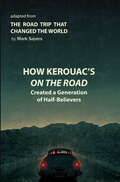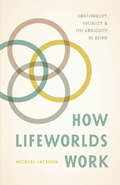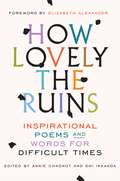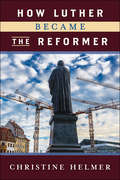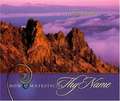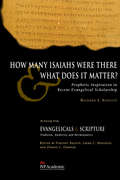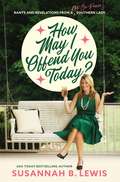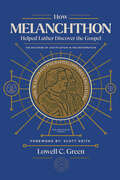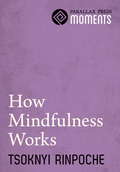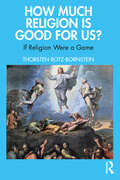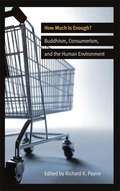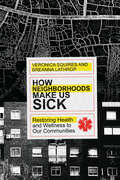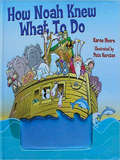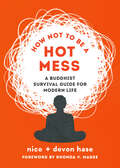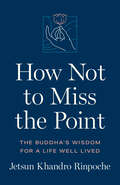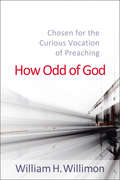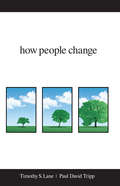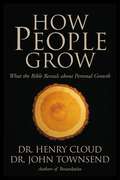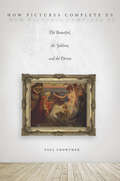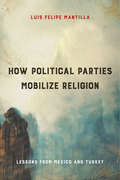- Table View
- List View
How Kerouac's On the Road Created a Generation of Half-Believers: Adapted from The Road Trip that Changed the World
by Mark SayersThe content in this short e-book is excerpted from The Road Trip That Changed the World, by Mark Sayers. The book examines the influence of Jack Kerouac on Western Culture and the Church from a Christian perspective.We live in a culture of the road—restless for adventure, glorifying experience, seeing life as a journey. Dissatisfied with where we are, we are constantly on the move to redefine our sense of home. Why do we see the world like this? How did we come to believe that our best chance of finding home is to be constantly moving?Jack Kerouac was one of America&’s original proponents of the culture of the road, documenting his famous road trip across America in his classic work, On the Road. The standards he set forth in that book have influenced Western culture and church so much that we still read his book, echo his philosophies, and make movies in the vein of his iconic road trip. (A movie adaptation of On the Road is set to release winter 2012.)In this twenty-minute read, Australian cultural commentator Mark Sayers examines how Kerouac&’s influence has shaped Western traditions, our cultural identity, and the church. By analyzing our culture of the road and its influence on us, he leads us to understanding what it means to have a true sense of home.
How Lifeworlds Work: Emotionality, Sociality, and the Ambiguity of Being
by Michael JacksonMichael Jackson has spent much of his career elaborating his rich conception of lifeworlds, mining his ethnographic and personal experience for insights into how our subjective and social lives are mutually constituted. In How Lifeworlds Work, Jackson draws on years of ethnographic fieldwork in West Africa to highlight the dynamic quality of human relationships and reinvigorate the study of kinship and ritual. How, he asks, do we manage the perpetual process of accommodation between social norms and personal emotions, impulses, and desires? How are these two dimensions of lived reality joined, and how are the dual imperatives of individual expression and collective viability managed? Drawing on the pragmatist tradition, psychology, and phenomenology, Jackson offers an unforgettable, beautifully written account of how we make, unmake, and remake, our lifeworlds.
How Lovely the Ruins: Inspirational Poems and Words for Difficult Times
by Elizabeth Alexander Annie Chagnot Emi IkkandaThis wide-ranging collection of inspirational poetry and prose offers readers solace, perspective, and the courage to persevere.In times of personal hardship or collective anxiety, words have the power to provide comfort, meaning, and hope. The past year has seen a resurgence of poetry and inspiring quotes—posted on social media, appearing on bestseller lists, shared from friend to friend. Honoring this communal spirit, How Lovely the Ruins is a timeless collection of both classic and contemporary poetry and short prose that can be of help in difficult times—selections that offer wisdom and purpose, and that allow us to step out of our current moment to gain a new perspective on the world around us as well as the world within. The poets and writers featured in this book represent the diversity of our country as well as voices beyond our borders, including Maya Angelou, W. H. Auden, Danez Smith, Rumi, Emily Dickinson, Naomi Shihab Nye, Alice Walker, Adam Zagajewski, Langston Hughes, Wendell Berry, Anna Akhmatova, Yehuda Amichai, and Robert Frost. And the book opens with a stunning foreword by Elizabeth Alexander, whose poem “Praise Song for the Day,” delivered at the inauguration of President Barack Obama, ushered in an era of optimism. In works celebrating our capacity for compassion, our patriotism, our right to protest, and our ability to persevere, How Lovely the Ruins is a beacon that illuminates our shared humanity, allowing us connection in a fractured world.Includes poetry, prose, and quotations from: Elizabeth Alexander • Marcus Aurelius • Karen Armstrong • Matthew Arnold • Ellen Bass • Brian Bilston • Gwendolyn Brooks • Elizabeth Barrett Browning • Octavia E. Butler • Regie Cabico • Dinos Christianopoulos • Lucille Clifton • Ta-Nehisi Coates • Leonard Cohen • Wendy Cope • E. E. Cummings • Charles Dickens • Mark Doty • Thomas Edison • Albert Einstein • Ralph Ellison • Kenneth Fearing • Annie Finch • Rebecca Foust • Nikki Giovanni • Stephanie Gray • John Green • Hazel Hall • Thich Nhat Hanh • Joy Harjo • Václav Havel • Terrance Hayes • William Ernest Henley • Juan Felipe Herrera • Jane Hirshfield • John Holmes • A. E. Housman • Bohumil Hrabal • Robinson Jeffers • Georgia Douglas Johnson • James Weldon Johnson • Paul Kalanithi • Robert F. Kennedy • Omar Khayyam • Emma Lazarus • Li-Young Lee • Denise Levertov • Ada Limón • Henry Wadsworth Longfellow • Nelson Mandela • Masahide • Khaled Mattawa • Jamaal May • Claude McKay • Edna St. Vincent Millay • Pablo Neruda • Anaïs Nin • Olga Orozco • Ovid • Pier Paolo Pasolini • Edgar Allan Poe • Claudia Rankine • Adrienne Rich • Rainer Maria Rilke • Alberto Ríos • Edwin Arlington Robinson • Eleanor Roosevelt • Christina Rossetti • Muriel Rukeyser • Sadhguru • Carl Sandburg • Vikram Seth • Charles Simic • Safiya Sinclair • Effie Waller Smith • Maggie Smith • Tracy K. Smith • Leonora Speyer • Gloria Steinem • Clark Strand • Wisława Szymborska • Rabindranath Tagore • Sara Teasdale • Alfred, Lord Tennyson • Vincent van Gogh • Ocean Vuong • Florence Brooks Whitehouse • Walt Whitman • Ella Wheeler Wilcox • William Carlos Williams • Virginia Woolf • W. B. Yeats • Saadi Youssef • Javier Zamora • Howard Zinn
How Luther Became the Reformer
by Christine HelmerNo story has been more foundational to triumphalist accounts of Western modernity than that of Martin Luther, the heroic individual, standing before the tribunes of medieval authoritarianism to proclaim his religious and intellectual freedom, “Here I stand!” How Luther Became the Reformer returns to the birthplace of this origin myth, Germany in the late nineteenth century, and traces its development from the end of World War I through the rise of National Socialism. Why were German intellectuals—especially Protestant scholars of religion, culture, and theology—in this turbulent period so committed to this version of Luther’s story? Luther was touted as the mythological figure to promote the cultural unity of Germany as a modern nation; in the myth’s many retellings, from the time of the Weimar Republic forward, Luther attained world-historical status. Helmer finds in this construction of Luther the Reformer a lens through which to examine modernity’s deformations, among them anti-Judaism, anti-Semitism, and anti-Catholicism. Offering a new interpretation of Luther, and by extension of modernity itself, from an ecumenical perspective, How Luther Became the Reformer provides resources for understanding and contesting contemporary assaults on democracy. In this way, the book holds the promise for resistance and hope in dark times.
How Majestic Is Thy Name: Delighting In The Grandeur Of God
by Steve Halliday Steve TerrillCombining the most astounding photography with the most terrific information and the most marvelous scripture, this is one of the finest and most elaborate gift books published by New Leaf Press.
How Many Isaiahs Were There and What Does It Matter?: Prophetic Inspiration in Recent Evangelical Scholarship (Wheaton Theology Conference Series)
by Richard L. SchultzEvangelicals Scripture: Tradition, Authority and Hermeneutics
How Marriage Became One of the Sacraments: The Sacramental Theology of Marriage from its Medieval Origins to the Council of Trent (Cambridge Studies In Law And Christianity)
by Philip L. ReynoldsAmong the contributions of the medieval church to western culture was the idea that marriage was one of the seven sacraments, which defined the role of married folk in the church. Although it had ancient roots, this new way of regarding marriage raised many problems, to which scholastic theologians applied all their ingenuity. By the late Middle Ages, the doctrine was fully established in Christian thought and practice but not yet as dogma. In the sixteenth century, with the entire Catholic teaching on marriage and celibacy and its associated law and jurisdiction under attack by the Protestant reformers, the Council of Trent defined the doctrine as a dogma of faith for the first time but made major changes to it. Rather than focusing on a particular aspect of intellectual and institutional developments, this book examines them in depth and in detail from their ancient precedents to the Council of Trent. Provides a comprehensive, up-to-date and critical analysis. Copiously documented with primary and secondary references for further study. Non-confessional and open to readers of all persuasions, in a field dominated by confessional and often defensive Catholic studies.
How May I Offend You Today?: Rants and Revelations from a Not-So-Proper Southern Lady
by Susannah B. LewisUSA Today bestselling author Susannah B. Lewis (creator of Whoa! Susannah) is back with another hilarious take on what so many people are thinking but are afraid to say aloud.Millions of online fans have flocked to Susannah B. Lewis's hysterical, take-no-prisoners rants about her pet peeves in everyday life. Now, in How May I Offend You Today?, Lewis turns her trademark humor to ordinary events that work her nerves--from people who wear t-shirts with indecent images to public displays of affection in the plumbing aisle of Lowe's--while keeping a wry eye on herself and her own temptation to vent grievances "like a teenage girl in overalls and Birkenstocks."Weaving together anecdotes from her distinctly Southern life with frequent references to the Bible, what she calls "our manual for living," Lewis says what many of us have thought, and in the process encourages us to stand firm in our views. The witty-yet-down-to-earth banter and uplifting, inspirational message of How May I Offend You Today? gives readers everywhere the boost necessary to make it through even their most trying days.
How Melanchthon Helped Luther Discover the Gospel: The Doctrine of Justification in the Reformation
by Lowell C GreenThis book is not claiming Melanchthon rediscovered the gospel. That honor belongs to his friend and mentor, Martin Luther. Nevertheless, Dr. Lowell C. Green argues that Melanchthon helped Luther in the task. Dr. Green knew that in choosing the title, How Melanchthon Helped Luther Discover the Gospel, he risked arousing the prejudice of those who look on Melanchthon with suspicion. Green is not blind to Melanchthon's faults; at times, he is critical of him. But, he debunks the myth that when Melanchthon came to Wittenberg in 1518, Luther had already developed his Reformational doctrine. Green shows that Melanchthon brought the tools of humanism to the aid of the emerging agitation. Although maintaining a subordinate role to Luther, Melanchthon helped him repeatedly at the turning points of the Reformation.Green asserts that Melanchthon was the first to speak of the authority of the Bible over the church. In his Baccalaureate Theses of 1519, Melanchthon became the first to articulate the forensic nature of justification. Most surprisingly, Melanchthon helped Luther move from the medieval view of faith as credulitas or adhaesio (adherence) to the Reformational view of faith as fiducia (trust) and assurance of salvation. Luther testified that he learned this from Melanchthon in 1518.As late as 1519, Luther had not yet abandoned the medieval view of grace as an infused substance. Melanchthon again led the way in 1520 when he declared that grace was simply the attitude of God-His favor. In his 1521 Loci Communes Melanchthon not only pointed out that grace is not something in us, but he made the important distinction between "grace" and "the gift of grace" (the Holy Spirit). Luther generously acknowledged the brilliance of Melanchthon's Loci Communes. This and other accolades Luther showered on Melanchthon are an indication of young scholar's influence on the great reformer's central teachings.Lowell C. Green was one of America's foremost Luther scholars, and his body of work continues to inform and shape Reformation studies today. This edition of How Melanchthon Helped Luther Discover the Gospel is the fruition of more than twenty-five years of Luther studies. Dr. Green's central thrust was to challenge the "Young Luther" cult which originated in the early 1900s and gained such a stranglehold on Luther studies in the 1950s and 1960s. In this volume, Green marshals the evidence gathered over a lifetime of study, joining his voice to a choir of scholars who challenge the central thesis of the "Young Luther" movement.After thoroughly demonstrating that Luther's early works contained a medieval or Roman Catholic "analytical justification," Green traces the emergence of the Reformational doctrine and a real break with medieval theology beginning in 1519.Green amply demonstrates that the mature Luther subscribed to and frequently expressed the doctrine of justification in forensic terms so that the glory of our salvation could be ascribed wholly to Christ and for the comfort of conscience against the accusing power of the law.
How Mindfulness Works
by Tsoknyi RinpocheHow Mindfulness Works> is part of the Parallax Press Moments series of short ebooks. A stand alone chapter from Solid Ground: Buddhist Wisdom for Difficult Times.
How Much Religion is Good for Us?: If Religion Were a Game
by Thorsten Botz-BornsteinHow Much Religion is Good for Us? is a provocative book which examines parallels between play and religion from a philosophical, theological, and anthropological perspective.Understanding “religion as a game” in the context of secular culture, it explores the “playful” patterning of spiritual and religious belief in modern societies. Drawing on the Nietzschean concept of a dead but powerful God, the book depicts modern civilizations as players treading a secular age in which the spirit of religion unconsciously survives. It argues that the spirit of religion is preserved in cultures in the form of a spiritual game, distilling moral precepts and imperatives much like poetry and works of art do. Comparative in scope, it references Christianity, Buddhism, Islam, Sufism, and Daoism.This interdisciplinary volume is an outstanding resource for students and scholars of Religious Studies, Islamic Studies, Cultural Studies, Philosophy, and Anthropology.
How Much is Enough?
by Richard K. PayneThe massive outpouring of consumer products available today might alone lead one to ask "How much is enough?" But at the same time, if we allow ourselves to see the social, political, economic and environmental consequences of the system that produces such a mass of "goods," then the question is not simply a matter of one's own personal choice, but points to the profound interconnectedness of our day to day decisions about "How much is enough?" The ease with which we can acquire massive quantities of food, clothing, kitchenware, and various electronic goods directly connects each of us with not only environmental degradation caused by strip mining in West Virginia, and with sweat shops and child labor in India or Africa, but also with the ongoing financial volatility of Western capitalist economies, and the increasing discrepancies of wealth in all countries. This interconnectedness is the human environment, a phrase intended to point toward the deep interconnection between the immediacy of our own lives, including the question of "How much is enough?," and both the social and natural worlds around us. This collection brings together essays from an international conference jointly sponsored by Ryukoku University, Kyoto, and the Institute of Buddhist Studies, Berkeley. The effects of our own decisions and actions on the human environment is examined from several different perspectives, all informed by Buddhist thought. The contributors are all simultaneously Buddhist scholars, practitioners, and activists - thus the collection is not simply a conversation between these differing perspectives, but rather demonstrates the integral unity of theory and practice for Buddhism.
How Neighborhoods Make Us Sick: Restoring Health and Wellness to Our Communities
by Veronica Squires Breanna LathropOur neighborhoods are literally making us sick. Buildings with mold trigger asthma and other respiratory conditions. Geographic lack of access to food and health care increases childhood mortality. Community violence traumatizes residents. Poverty, unemployment, inadequate housing, food insecurity, racial injustice, and oppression cause physical changes in the body, resulting in disease and death. But there is hope. Loving our neighbor includes creating social environments in which people can be healthy. While working in community redevelopment and treating uninsured families, Veronica Squires and Breanna Lathrop discovered that creating healthier neighborhoods requires a commitment to health equity. Jesus' ministry brought healing through dismantling systems of oppression and overturning social norms that prevented people from living healthy lives. We can do the same in our communities through addressing social determinants that facilitate healing in under-resourced neighborhoods. Everyone deserves the opportunity for good health. The decisions we make and actions we take can promote the health of our neighbors.
How Noah Knew What to Do
by Karen Ann MooreChildren are often afraid to try something new. This story will show them how they can trust God to help them do what they need to do--just like He did Noah. How Noah Knew What to Do shows how, even though Noah wasn't a veterinarian or even a ship builder, he listened to God and trusted Him to help him build the ark and fill it with animals. Karen Ann Moore's delightful rhyming text along with Pete Kersten's whimsical illustrations make this a fun way for children to learn they can rely on God in every situation, even when they're doing something they've never done before. Kids will see that obeying God can mean saying "yes" even when the obstacles seem hard to overcome. A gel-pack water-waves novelty that's built into the front cover makes for lots of giggles.
How Not to Be a Hot Mess: A Buddhist Survival Guide for Modern Life
by nico hase devon haseThe dumpster fire of life rages on, but you got this. Practice six rules to keep you grounded, weather the storm, and actually be a decent person.It may seem like the world is going to hell in a hand basket right now. Whether it's big stuff like politics and climate change, or just the daily spin of paying your bills, getting to work on time, and fending off social media trolls, we can all admit, modern life ain't easy. Here are six really good guiding principles, inspired from the ancient wisdom of Buddhism and mindfulness practice, to keep you anchored and steady amidst the chaos.
How Not to Be a Hot Mess: A Survival Guide for Modern Life
by Craig Hase Devon HaseThe dumpster fire of life rages on, but you got this. Practice six rules to keep you grounded, weather the storm, and actually be a decent person.It may seem like the world is going to hell in a hand basket right now. Whether it's big stuff like politics and climate change, or just the daily spin of paying your bills, getting to work on time, and fending off social media trolls, we can all admit, modern life ain't easy. Here are six really good guiding principles, inspired from the ancient wisdom of Buddhism and mindfulness practice, to keep you anchored and steady amidst the chaos.
How Not to Miss the Point: The Buddha's Wisdom for a Life Well Lived
by Jetsun Khandro RinpocheCut through the noise and explore mind-changing Buddhist teachings from one of the clearest voices from the Tibetan tradition. Written in her direct and personal style, it&’s the perfect &“first book&” for anyone curious about Buddhism, as well as those with experience who will benefit from her powerful message.We&’re bombarded with advice about how to live—how to find happiness, how to maintain relationships, how to help the world—and yet has this advice brought us peace? In How Not to Miss the Point, beloved Buddhist teacher Jetsun Khandro Rinpoche focuses on the Buddha&’s core teachings, basic principles that are universally true, whether we are Buddhist or not, as a way to cultivate our inner light and work for good, no matter how the world unfolds around us.Because the simplicity of the Buddha&’s fundamental teachings can often get lost in complexity, Rinpoche goes straight to their heart to convey the Buddha&’s core message: If we want this life—our own life, the lives of others, and the life of our planet—to be fulfilling and good, we must accept responsibility for cultivating the best qualities of our human mind. To put the how-and-why into practice, Rinpoche guides us through the steps of the Buddha&’s path.
How Now Shall We Live
by Charles Colson Nancy PearceyChristianity is more than a personal relationship with Jesus Christ. It is also a worldview that not only answers life's basic questions--Where did we come from, and who are we? What has gone wrong with the world? What can we do to fix it?
How Odd of God
by William H. WillimonElection is a strange word when used in theology. It brings to mind old debates about what God might or might not have done before the foundation of the world. But viewed apart from that historical baggage, the word election is about a central gospel idea: that in Jesus not only does God choose to be God for us but chooses us to be for God. The calling of the disciples in the gospels is a story of election, of how God chooses to transform the world by choosing us to be messengers and agents of that transformation. So it is, says William Willimon, that election becomes not just the content of our preaching but the means as well. God chooses preachers. How unlikely--how odd--is it that God should entrust the proclamation of the gospel to, well, us? This unpredictable, electing God reaches out to save the world and then leaves it in the hands of preachers to get the word out? Through us, through our stammering tongues and faltering hearts, the preached word becomes the Word of God. If you wonder why you drag yourself into the pulpit every Sunday, if you worry that your sermons aren't reaching past the front pew, then read this book and be encouraged. God chooses; God chooses preachers; God chooses you.
How Our Bible Came to Us (First Edition)
by Meryl DoneyThe book discusses how the Bible came into being, who wrote it, early and modern translations, monks and manuscripts, and the importance of the Bible.
How People Change: How Christ Changes Us By His Grace (Vantage Point Book Ser.)
by Paul David Tripp Timothy S. LaneA changed heart is the bright promise of the gospel.When the Bible talks about the gift of a new heart, it doesn't mean a heart that is immediately perfected, but a heart that is capable of being changed. Jesus' work on the cross targets our hearts, our core desires and motivations, and when our hearts change, our behavior changes. It's amazing to watch people who once seemed stuck in a pattern of words, choices, and behaviors start living in a new way as Christ changes their hearts.
How People Grow: What the Bible Reveals About Personal Growth
by Henry Cloud John TownsendAll growth is spiritual growth. Authors Drs. Cloud and Townsend unlock age-old keys to growth from Scripture to help people resolve issues of relationships, maturity, emotional problems, and overall spiritual growth. They shatter popular misconceptions about how God operates and show that growth is not about self-actualization, but about God's sanctification. In this theological foundation to their best-selling book Boundaries, they discuss:*?What the essential processes are that make people grow*?How those processes fit into a biblical understanding of spiritual growth and theology*?How spiritual growth and real-life issues are one and the same*?What the responsibilities are of pastors, counselors, and others who assist people in growing--and what your own responsibilities are in your personal growth
How People Grow: What the Bible Reveals About Personal Growth
by Henry Cloud John TownsendAll growth is spiritual growth. Authors Drs. Cloud and Townsend unlock age-old keys to growth from Scripture to help people resolve issues of relationships, maturity, emotional problems, and overall spiritual growth. They shatter popular misconceptions about how God operates and show that growth is not about self-actualization, but about God’s sanctification. In this theological foundation to their best-selling book Boundaries, they discuss: • What the essential processes are that make people grow • How those processes fit into a biblical understanding of spiritual growth and theology • How spiritual growth and real-life issues are one and the same • What the responsibilities are of pastors, counselors, and others who assist people in growing—and what your own responsibilities are in your personal growth
How Pictures Complete Us: The Beautiful, the Sublime, and the Divine
by Paul CrowtherDespite the wonders of the digital world, people still go in record numbers to view drawings and paintings in galleries. Why? What is the magic that pictures work on us? This book provides a provocative explanation, arguing that some pictures have special kinds of beauty and sublimity that offer aesthetic transcendence. They take us imaginatively beyond our finite limits and even invoke a sense of the divine. Such aesthetic transcendence forges a relationship with the ultimate and completes us psychologically. Philosophers and theologians sometimes account for this as an effect of art, but How Pictures Complete Us distinguishes itself by revealing how this experience is embodied in pictorial structures and styles. Through detailed discussions of artworks from the Renaissance through postmodern times, Paul Crowther reappraises the entire scope of beauty and the sublime in the context of both representational and abstract art, offering unexpected insights into familiar phenomena such as Ideal beauty, pictorial perspective, and what pictures are in the first place.
How Political Parties Mobilize Religion: Lessons from Mexico and Turkey (Religious Engagement in Democratic Politics)
by Luis Felipe MantillaPolitical mobilization tends to take different forms in contemporary Catholic- and Sunni-majority countries. Luis Felipe Mantilla attributes this dynamic to changes taking place in religious communities and the political institutions that govern religious political engagement. In How Political Parties Mobilize Religion, Mantillaevenhandedly traces the emergence and success of religious parties in Mexico and Turkey, two countries shaped by assertive secular regimes. In doing so, he demonstrates that religious parties are highly responsive to political institutions, such as electoral laws, as well as to the structure of broader religious communities. Whereas in both countries, the electoral success of religious mobilizers was initially a boon for democracy, in Mexico it was marred by political mismanagement and became entangled with persistent corruption and escalating violence. In Turkey, the democratic credentials of religious mobilizers were profoundly eroded as the government became increasingly autocratic, concentrating power in very few hands and rolling back basic liberal rights. Mantilla investigates the role religious mobilization plays in the evolution of electoral politics and democratic institutions, and to what extent their trajectories reflect broader trends in political Catholicism and Islam.
